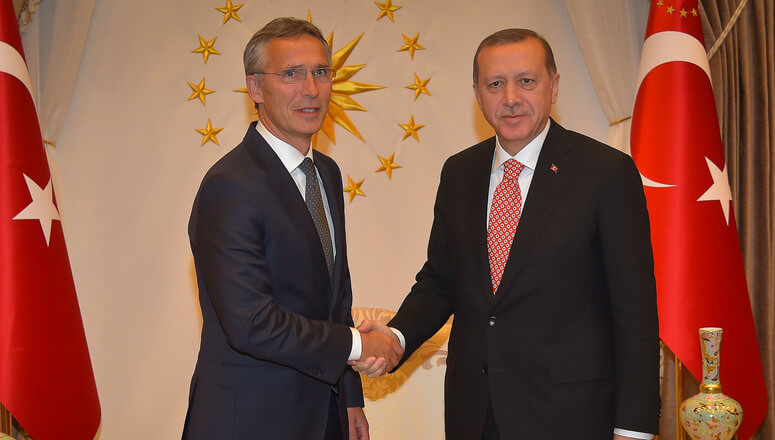Turkish President Recep Tayyip Erdoğan warned that he will “never change” his stance on Finland and Sweden’s bids to joint the North Atlantic Treaty Organization (NATO) unless they take “concrete steps” to address Ankara’s concerns.
“We shall never change our stance on the NATO issue until Sweden and Finland take clear and concrete steps in the fight against terror,” Erdoğan said while addressing a gathering of members of his Justice and Development Party (AKP) in Ankara.
Turkey has opposed the Nordic countries’ bid to join NATO citing their support for Kurdish militants. It has accused Helsinki and Stockholm of harbouring People’s Defence/Protection Units (YPG) and the Kurdistan Workers Party (PKK) “terrorists” and refusing to extradite the groups’ leaders to Turkey.
Erdogan says as long as PKK terrorists demonstrate in Sweden’s streets, and terrorist leaders appear on the Swedish TV, Turkey cannot say yes to its NATO member bid.
— Ragıp Soylu (@ragipsoylu) June 8, 2022
He says same goes for Finland
Furthermore, Turkey was furious after Sweden and Finland imposed arms embargoes and sanctions on it for launching an operation against the YPG in Syria in 2019.
In this respect, Erdoğan said, “While the fallen of our country are tearing our hearts out on a daily basis, no one can expect concessions from us on this issue,” referring to the Turkish soldiers killed while fighting Kurdish militias. “Let me underline that Turkey has no time to lose with expectations or ambivalent remarks regarding the issue.”
Also Read: What’s Really Behind Turkey’s Opposition to Finland and Sweden’s NATO Applications?
He also reiterated his position to NATO Secretary-General Jens Stoltenberg. During a phone call with the NATO chief on Wednesday, Erdoğan made clear that “there would be no progress on the issue until both of the countries took concrete steps meeting Turkey’s rightful expectations.”
Echoing these sentiments, Turkish Foreign Minister Mevlüt Çavuşoğlu said during a meeting with his Norwegian and Irish counterparts in Ankara on Wednesday that the Nordic countries’ responses have not addressed Ankara’s security concerns. He also rejected a document submitted by Sweden last week outlining the changes it intended to make on Turkey’s request.
#Turkish President Erdogan's brinkmanship tactic to hold #Sweden and #Finland's NATO bids as hostage in order to extract concessions from the US continues for now. pic.twitter.com/AlyZSxkK7q
— Abdullah Bozkurt (@abdbozkurt) June 15, 2022
In the document, Sweden condemned terrorism in all its forms and vowed to contribute to Turkey’s security, including by making tougher terrorism laws. However, it failed to mention what exactly the legislation would deal with and did not address the issue of deporting Kurdish militants to Turkey.
Last month, while Turkey acknowledged the “positive approach” displayed by Finland and Sweden, it still continued to block their bids. Presidential spokesperson İbrahim Kalın said that Ankara welcomed the Nordic countries’ efforts to lift weapons export restrictions, but said he saw no progress on Turkey’s demand to extradite Kurdish “terrorists”—28 from Sweden and 12 from Finland.
Constructive conversation with President @RTErdogan ahead of the #NATOsummit. We discussed the importance of addressing #Türkiye’s legitimate security concerns on the fight against terrorism & making progress in the #NATO accession process for #Finland & #Sweden.
— Jens Stoltenberg (@jensstoltenberg) June 15, 2022
Following Russia’s invasion of Ukraine, concerns were raised in Finland and Sweden that they would be defenceless against a similar invasion unless they joined NATO. However, Turkey has used its clout as a member of the alliance to stall the Nordic countries’ bids to demand that NATO members accept Ankara’s fight against the YPG and PKK. To accept new members, NATO must get the green light from all members, including Turkey.
Earlier this week, Stoltenberg acknowledged that Turkey’s concerns are legitimate, saying that “no other NATO ally has suffered more terrorist attacks than Turkey.” He added, “We have to address the security concerns of all allies, including Turkish concerns about the terrorist group PKK.”

